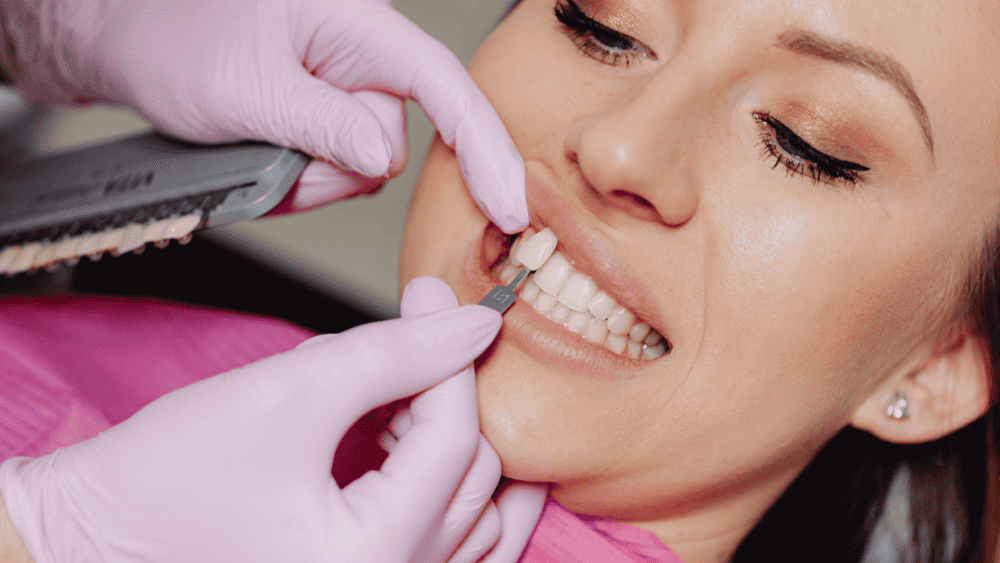9:30 AM - 5 PM
10 am - 7 pm
11 AM - 7 PM
9:30 AM - 5 PM
10 am - 4 pm
Closed

When it comes to fixing cosmetic dental problems, there are a few different options available to improve the appearance of your teeth. Dental bonding and veneers are two of the most popular methods.
If you're considering dental work, you may be wondering whether bonding or veneers would be a better option for you. Both can achieve great results, but they have different benefits and drawbacks.
In this post, we'll take a look at the pros and cons of each treatment so that you can make an informed decision and decide which is right for you. Keep in mind that the best way to find out which treatment is right for you is to consult with your dentist. So without further ado, let's take a closer look at dental bonding vs veneers!

Dental bonding is a common dental procedure that can be used to improve the appearance of your smile.
Bonding is most often used to repair cracks, chips, and gaps in your teeth. It can also be used to change the shape or color of your teeth. Bonding is usually done in one office visit, and it does not require any anesthesia.
Dental bonding is made up of a composite resin. It can be applied directly to the teeth and shaped into its desired appearance.
Bonding is generally less expensive than other dental procedures, such as veneers. When it comes to the cost, in general, dental bonding can cost anywhere from $100 to $1,000 per tooth.
However, many dental insurance plans will cover at least a portion of the cost of dental bonding, so be sure to check with your insurance provider to see if you have coverage.
While dental bonding may have some advantages, there are also some disadvantages to consider.
One downside of dental bonding is that it may not last as long as other dental procedures. Bonding may also chip or stain over time. If you are considering dental bonding, be sure to discuss the pros and cons with your dentist to see if it is right for you.

Veneers are a type of dental prosthetic that can be used to improve the appearance of your teeth. They are thin shells of porcelain or composite that are bonded to the front surface of your teeth. Veneers are custom-crafted to match the shape and color of your natural teeth.
They can be used to correct a wide range of aesthetic concerns, including chips, cracks, gaps, and discoloration. In addition, veneers are much more durable than other types of dental treatments, such as teeth whitening or bonding, and they can last for many years with proper care.
The cost of veneers varies depending on a number of factors, but typically ranges from $500-$2,000 per veneer. The exact cost will depend on the type of veneer you choose, the number of veneers you need, and the dentist you work with. However, veneers are generally a very cost-effective way to greatly improve the appearance of your smile.
Like all dental procedures, there are some risks associated with veneers. The most common complication is gum irritation, which can occur if the veneers are not fitted properly. In rare cases, the veneers may also chip or break, and the underlying tooth may be damaged. Veneers are also irreversible, because they involve a permanent change to your teeth.
These two treatments are not necessarily better than one another. Rather, they simply are used in different situations. For those with minor imperfections, dental bonding is an excellent and affordable option.
In cases where patients want to enhance their smiles further, cover significant gaps or change the length and size of their teeth, veneers are an excellent option as well.
Both procedures will improve the appearance of your smile, it is simply a matter of determining which option is best for your specific case.
The best way to determine which procedure meets your specific needs is to meet with our dentists for a personalized consultation.
Both dental bonding and veneers are excellent treatments to help improve the appearance of your smile. Both have their pros and cons and it is best to contact a dental professional in order to determine which cosmetic dental procedure is best for you.
The team at Glen Dental Centre will be happy to assist you. Book your appointment today.
Get in touch with us!
(604) 552-2241
info@glendentalcentre.com
2975 Glen Drive, Coquitlam, BC V3B 2P7